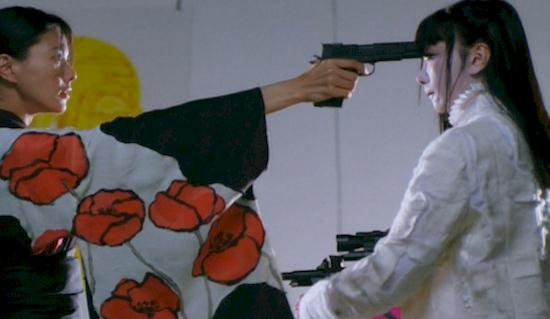|
|
|
|
|
|
|
|
|
|
|
Pistol
Opera |
|
|
| |
|
review | notes | availability | |
|
|
|

Pistol-packing weirdness from Pistol Opera. |
|
|
Year: |
2001 |
|
|
|
Director: |
Seijun
Suzuki |
|
|
| |
Producer: |
Satoru Ogura, Ikki Katashima |
|
| |
Cast: |
Makiko Esumi, Sayoko Yamaguchi, Hanae Kan, Masatoshi Nagase, Kirin
Kiki, Haruko Kato, Mikijiro Hira, Kenji Sawada |
|
| |
The
Skinny: |
Avant-garde filmmaker Seijun Suzuki remakes his own Branded to
Kill with this promising, but ultimately disappointing 2001
update. |
|
|
Review by
Calvin
McMillin: |
I'm probably not the best guy to critique
Seijun Suzuki's Pistol Opera—at least, in the opinion
of those out there expecting a favorable review. The last film of
his that I watched was the 1966 cult favorite Tokyo Drifter,
which seemed to have all the ingredients for a surefire winner.
Sadly, I found that Tokyo Drifter's unique sense of style
couldn't compensate for its obvious lack of substance. But though
I had a negative opinion about that particular Suzuki film, I honestly
went into Pistol Opera with high hopes and an open mind.
And to Suzuki's credit, his visual flair has actually improved with
age instead of dimming over the years. Unfortunately, his regard
for even the basic requirements of movie realism has not.
Pistol Opera is at once a sequel
and a remake of Suzuki's 1967 film Branded to Kill, a box
office dud that got Suzuki fired from Nikkatsu studios, but subsequently
earned him a cult following. In this contemporary update, we meet
the beautiful "Number Three Killer" known as Stray Cat
(Makiko Esumi) who covets the top spot held by the mysterious killer,
100 Eyes. In her quest to eliminate the top-ranked assassin, Stray
Cat takes orders from a mysterious masked female, meets a preternaturally
creepy young fan, and gets advice from an elderly assassin named
Number Zero (Mikijiro Hira) along the way. Oh, and double-crosses
ensue, and people die. Sounds intriguing, right?
One adjective that could be used in
describing Pistol Opera is "experimental." However,
that isn't necessarily a good thing since many an experiment has
been known to backfire, and Pistol Opera is prime evidence
of that. The film certainly looks fantastic, with vibrant colors,
spectacular set design, an eye-catching wardrobe, and more than
a couple breathtaking vistas. Even better, nearly all of the major
characters possess such a distinctive look, that under the right
circumstances, any one of them could carry a film—so strong
is Suzuki's attention to creating remarkable characters. He manages
to create a truly unique, if eccentric, vision of the world. But
all this focus on the visuals so amplifies the expectation level
that the film can't even begin to match them.
What is absolutely infuriating about
Pistol Opera is Suzuki's blatant (and presumably intentional)
disregard for such little niceties as logic, continuity, and plot.
For example, in one scene early in the film, a couch suddenly appears,
disappears, and then reappears in a matter of seconds. Even worse,
the acting and the action is far too formalized to take seriously
as the actors do things that are, quite honestly, just plain weird.
Suzuki fans may claim that I am missing the point of the entire
movie—that all this craziness is Suzuki's bold attempt to break
free from the constraints of reality and therefore, it is the very
absurdity of the film that makes Pistol Opera so much fun.
To put it mildly (and without the use of expletives), that's ridiculous.
While I will concede that many great films are guilty of the same
things that I criticize Pistol Opera for, in all those cases,
the movies offered something for compensation. Zany comedies like
Naked Gun and Airplane aren't tied in the least to
any semblance of reality, but that's part of the joke. Pistol
Opera, on the other hand, is just too damn pretentious to be
funny. Well, I will admit that the gun-toting, wheelchair-bound,
green track-suited assassin in the first act did make me crack a
smile, but that's about it.
Sure, my opinion of the film might improve
based on a second viewing, but at this point, I can't go along with
the popular perception that Pistol Opera is a great film.
Despite its art house credentials and stylish facade, the movie
is just about as meaningful as the latest mindless action flick
churned out by the Hollywood machine. Ultimately, Pistol Opera
ranks as a definite artistic work, but as a good movie? Not by a
long shot. (Calvin McMillin, 2003) |
|
|
Notes: |
• Number Zero (played by Mikijiro Hira) is actually the "Number
Three Killer" from the first film, Goro Hanada. In Branded
to Kill, Jo Shishido portrayed the character, but for reasons
that have never been made clear, he was not asked to reprise his
famous role. |
|
|
Availability: |
DVD (USA)
Region 1 NTSC
Tokyo Shock
Full Screen
Japanese Language Track
English Subtitles
Trailers |
|
|
|
image
courtesy of Tokyo Shock
|
|
|
|
|
|
|
|
|
|
|
|
|
|
|
|
| LoveHKFilm.com
Copyright ©2002-2017 Ross Chen
|
|
|